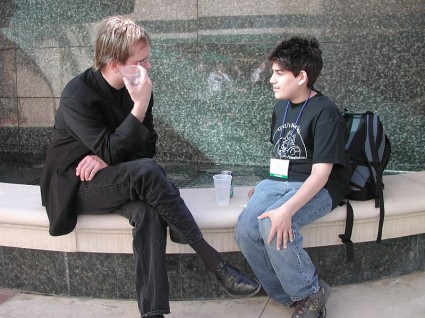October 24, 2014
[clickbait] Copyright is sodomy
A year ago, Harold Feld posted one of the most powerful ways of framing our excessive zeal for copyright that I have ever read. I was welling up even before he brought Aaron Swartz into the context.
Harold’s post is within a standard Jewish genre: the d’var Torah, an explanation of a point in the portion of the Torah being read that week. As is expected of the genre, he draws upon a long, self-reflective history of interpretation. I urge you to read it because of the light it sheds on our culture of copyright, but it’s also worth noticing the form of the discussion.
The content: In the Jewish tradition, Sodom’s sin wasn’t sexual but rather an excessive possessiveness leading to a fanatical unwillingness to share. Harold cites from a collection of traditional commentary, The Ethics of Our Fathers:
“There are four types of moral character. One who says: ‘what is mine is mine and what is yours is yours.’ This is an average person. Some say it is the Way of Sodom. The one who says: ‘what is mine is yours and what is yours is mine,’ is ignorant of the world. ‘What is mine is yours and what is yours is yours’ is the righteous. ‘What is mine is mine and what is yours is mine’ is the wicked.”
In a PowerPoint, it’d be a 2×2 chart. Harold’s point will be that the ‘what is mine is mine and what is yours is yours.’ of the average person becomes wicked when enforced without compassion or flexibility. Harold evokes the traditional Jewish examples of Sodom’s wickedness and compares them to what’s become our dominant “average” assumptions about how copyright ought to work.
I am purposefully not explaining any further. Read Harold’s piece.
The form: I find the space of explanation within which this d’var Torah — and most others that I’ve heard — operates to be fascinating. At the heart of Harold’s essay is a text accepted by believers as having been given by God, yet the explanation is accomplished by reference to a history of human interpretations that disagree with one another, with guidance by a set of values (e.g., sharing is good) that persevere in a community thanks to that community’s insistent adherence to its tradition. The result is that an agnostic atheist like me (I’m only pretty sure there is no God) can find truth and wisdom in the interpretation of a text I take as being ungrounded in a divine act.
But forget all that. Read Harold’s post, bubbelah.









